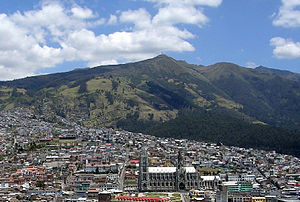The Battle of Pichincha
The Battle of Pichincha occurred on
May 24, 1822 on the slopes of Pichincha volcano, over 3,000 meters above sea
level, near the city of Quito in Ecuador today.
The
meeting, which took place in the context of the Spanish-American Wars of
Independence, faced the independentista army under the leadership of Venezuelan
general Antonio Jose de Sucre and the realistic army commanded by General
Melchor de Aymerich. The defeat of the Spanish forces led to the liberation of
Quito and assured independence the provinces that belonged to the Royal
Audience of Quito, also known as the Presidency of Quito.
May 24 is considered a civic date
of the heroes who gave their lives for freedom. With the Battle of Pichincha,
Ecuador political independence that marked the beginning of the Republican and
independent life of Ecuador was sealed.
Celebration
It is celebrated with military acts
in the Top of Liberty and parades in the streets of the capital commemorating
188 years of the Battle of Pichincha. On the slopes of this volcano, May 24,
1822, the troops of Antonio Jose de Sucre reached Independence of Ecuador.
Cultural spaces
Museums and different spaces in the historic center remain open during this time and some museums are: City, Florida, Rumipamba, Maria Augusta Urrutia, El Panecillo, Temple of the Fatherland, Capilla del Hombre, the Convento San Francisco, La Cathedral, St. Catherine of Siena, Camilo Egas, San Diego, Alberto Mena Caamaño Wax and Casa de Sucre.
and Other options are the Carondelet Palace, the House of Praise, the Metropolitan Cultural Center, Cumandá Urban Park, the church The Company and Yaku - Water Museum Park.
Gastronomy
and the most known Microbrew This product has gained popularity in the city for its taste and quality can be enjoyed in craft breweries like Brewery Avysmo Av. 12 de Octubre and Foch, Bandido Brewing Co. Olmedo and Fermín Cevallos , Cherusker Brewery Joaquín Pinto and Diego de Almagro and La Bodega Cumbayá.
Feature of this Battle
- The patriot army had 2,900 men, most grancolombinos battalions Paya, Magdalena and Yaguachi and Peruvian Trujillo and Piura battalions. There were also British and Argentine. The royalists had 3000 soldiers

- Sucre had brought his troops from Guayaquil to Quito, in order to expel the Spaniards in this city. After many hardships arrived at the foot of the Pichincha volcano on May 23, 1822
- At night he ordered the rise and at dawn on May 24 had won good height. But the Spaniards spotted and climbed the volcano to face them.
- In the violent clash Patriots battalions they fought bravely, but had little ammunition and suffered many casualties by enemy fire. When it seemed that the triumph was in favor of the Spaniards, he appeared on the heights battalion Albion (English), with ammunition and reinforcements. Patriots returned to the charge and managed to disrupt and put to flight the enemies.
- victory on the slopes of Pichincha to several factors, mainly the movement of troops, diversionary operations and the provision of effective determined the libertarian triumph must.

- Patriot victory in Pichincha allowed the release of Quito and its annexation to the Republic of Gran Colombia, whose president was Don Simon Bolivar. The Liberator subsequently made his triumphal entry to Quito on June 16, 1822.


No hay comentarios.:
Publicar un comentario